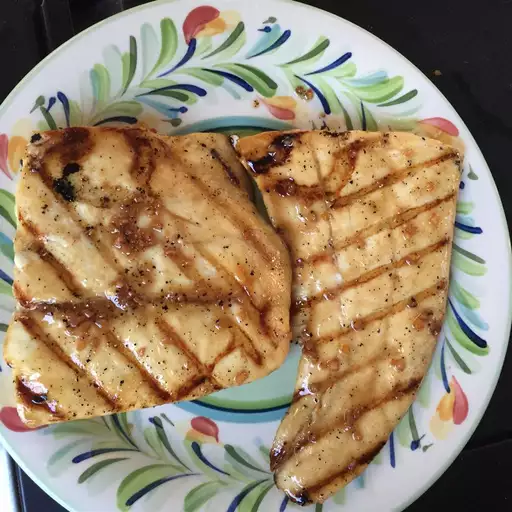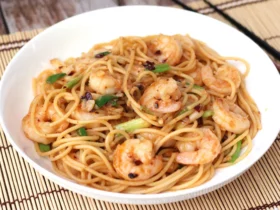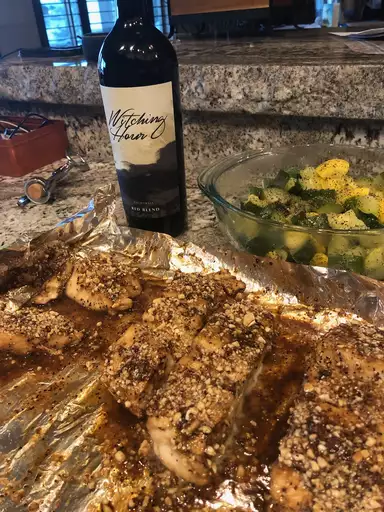Background and History
Halibut, a large flatfish known for its mild flavor and firm texture, has been a staple in coastal cuisines for centuries. Barbecuing halibut steaks adds a smoky, rich flavor that enhances the natural taste of the fish. This method of cooking likely originated from seaside communities where fresh catches were often grilled over open flames, providing a quick and delicious way to enjoy seafood. Barbecued halibut has gained popularity for its simplicity and the ability to infuse the fish with a variety of marinades and spices.
Ingredients
- 4 halibut steaks (about 6 oz each)
- 1/4 cup olive oil
- 2 tablespoons soy sauce
- 1 tablespoon lemon juice
- 1 tablespoon brown sugar
- 2 cloves garlic, minced
- 1 teaspoon smoked paprika
- 1/2 teaspoon black pepper
- 1/2 teaspoon salt
- Lemon wedges (for serving)
- Fresh parsley, chopped (optional, for garnish)
Serves
- 4 people
Time
- Preparation Time: 15 minutes
- Marinating Time: 30 minutes (optional, but recommended)
Cooking Time
- 10-12 minutes
Instructions
Prepare the Marinade
In a bowl, mix together olive oil, soy sauce, lemon juice, brown sugar, minced garlic, smoked paprika, black pepper, and salt until well combined.
Marinate the Halibut
Place the halibut steaks in a resealable plastic bag or a shallow dish. Pour the marinade over the fish, ensuring each steak is well coated. Seal the bag or cover the dish and refrigerate for at least 30 minutes for best results.
Preheat the Grill
Preheat your grill to medium-high heat (about 400°F/200°C). Brush the grill grates with oil to prevent sticking.
Grill the Halibut
Remove the halibut steaks from the marinade and let excess marinade drip off. Place the steaks on the grill and cook for 4-6 minutes per side, or until the fish is opaque and flakes easily with a fork. Avoid overcooking to keep the fish moist.
Serve
Transfer the grilled halibut to a serving platter. Garnish with lemon wedges and chopped fresh parsley if desired. Serve immediately.
Nutrition Facts (per serving)
- Calories: 300
- Protein: 35g
- Fat: 15g
- Carbohydrates: 2g
- Fiber: 0g
- Sugar: 1g
- Sodium: 400mg
Notes
- Variations: Try different marinades such as teriyaki, herb butter, or citrus-based blends to customize the flavor.
- Side Dishes: This dish pairs well with grilled vegetables, rice pilaf, or a light quinoa salad.
Allergy Warning
- Contains soy (soy sauce).
- Ensure all ingredients are free from other allergens if cooking for someone with food allergies.
Enjoy your delicious barbecued halibut steaks! This recipe combines the fresh, mild flavor of halibut with a smoky marinade, perfect for a summer barbecue or a special dinner.
FAQs About Grilling Halibut Steaks
How do you grill halibut without it sticking?
To prevent halibut from sticking to the grill, make sure to preheat the grill properly and brush the grates with oil. Additionally, oiling the fish lightly and using a clean, hot grill will help create a non-stick surface.
How is halibut supposed to be cooked?
Halibut should be cooked until it is opaque and flakes easily with a fork. This usually takes about 4-6 minutes per side on a medium-high grill, ensuring the fish is moist and tender without being overcooked.
Does halibut fall apart on the grill?
Halibut can fall apart on the grill if overcooked or if the grill is not properly preheated and oiled. Using a fish spatula and handling the fish gently can help keep the steaks intact.
Should you soak halibut before cooking?
Soaking halibut before cooking is not necessary, but marinating it can enhance flavor and tenderness. A marinade with oil, acid (like lemon juice), and seasonings works well.
Why is halibut difficult to cook?
Halibut can be challenging to cook because it dries out quickly if overcooked. Its lean flesh requires careful attention to cooking time and temperature to maintain moisture.
How to cook halibut so it doesn’t dry out?
To keep halibut from drying out, avoid overcooking it. Cooking it to an internal temperature of 130-135°F (54-57°C) and using marinades or basting with butter can help retain moisture.
Why is my halibut rubbery?
Halibut becomes rubbery when it is overcooked. Cooking it to the right temperature and ensuring it is not exposed to excessive heat for too long will prevent this texture.
What happens if you don’t rinse fish before cooking?
Not rinsing fish before cooking can leave surface contaminants or residual scales on the fish. Rinsing and patting it dry with paper towels helps ensure a clean surface and better seasoning adherence.
Should halibut be soaked in milk?
Soaking halibut in milk can help remove any fishy odors and impart a milder flavor. The proteins in milk bind with fishy compounds, neutralizing them for a cleaner taste.
Why does my halibut taste fishy?
Halibut can taste fishy if it is not fresh. To ensure the best flavor, buy fresh halibut from a reputable source, and store it properly. Soaking in milk before cooking can also help reduce any fishy taste.
- Best LeadsGorilla Alternatives for 2025 - April 22, 2025
- Best Leadzai Alternatives for 2025 - April 22, 2025
- Best LeadSwift Alternatives for 2025 - April 21, 2025















